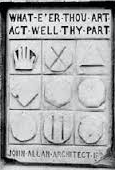David O. McKay Learns to Act Well His
As a young missionary serving in Scotland, David O. McKay had a difficult start to his mission, struggling with homesickness and discouragement. He was assigned to serve in Stirling, a city forty miles northeast of Glasgow; at least that was encouraging, since he was intrigued by the ancient castle that graced the city.
One morning, while tracting, he and his companion were rebuffed by an outspoken Scotchwoman who was probably thinking of the Mormon association with polygamy: "Ye can gang awa' hame; ye canna hae ony o' oor lassies!" In their discouragement, the two missionaries decided to spend most of the day touring and exploring the city's castle.
Elder McKay later shared in a conference address:
"I was discouraged, I was just starting my first mission. I had been snubbed that day in tracting. I was homesick, and we walked around the Stirling Castle, really not doing our duty, and as we re-entered the town I saw a building, half-finished, and to my surprise, from the sidewalk I saw an inscription over the lintel of the front door, carved in stone. I said to Brother Johnson, 'I want to go over and see what that is.' I was not more than half way up the pathway leading to it, when that message struck me, carved there: 'What e'er thou art, act well thy part.'"
Elder McKay was moved by that simple message, and his conscience was pricked. He later stated:
"I said to myself, or the Spirit within me, 'You are a member of the Church of Jesus Christ of Latter-day Saints. More than that, you are here as a representative of the Lord Jesus Christ. You accepted the responsibility as a representative of the Church.' Then I thought what we had done that forenoon. We had been sightseeing; we had gained historical instruction and information, it is true, and I was thrilled with it....However, that was not missionary work.... I accepted the message given to me on that stone, and from that moment we tried to do our part as missionaries in Scotland."
President McKay used the lesson to challenge a group of Priesthood brethren:
"What are you? You are men who hold the priesthood of God, who hold divine authority to represent Deity in whatever position to which you have been assigned. When a man, an ordinary man is set apart in his community as a sheriff, there is something added to him. When a policeman on these streets, at the crossing, holds up his hand, you stop. There is something more about him than just an individual, there is the power that is given him. And so it is throughout life. No man can be given a position without being enhanced. It is a reality. So, too, Is the power of the priesthood.... Are you a deacon, do the duties of a deacon well. Are you a teacher, do your work well. A priest watching over the Church, visiting with them,—young men in this Church, if we could just do the duties of the teacher and of the priest, teaching people their duty, what a power for good to young men eighteen years of age, and nineteen. Not incorrigible, not recreants, but leaders. Brethren there is nothing in the world so powerful in guiding youth as to have them act well their parts in the priesthood."
(Conference Report, October 1954, pp. 83-4; McKay, Gospel Ideals, pp. 520-21; Gibbons, David O. McKay, pp. 43-45)
